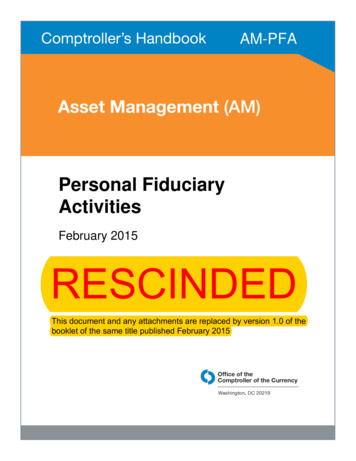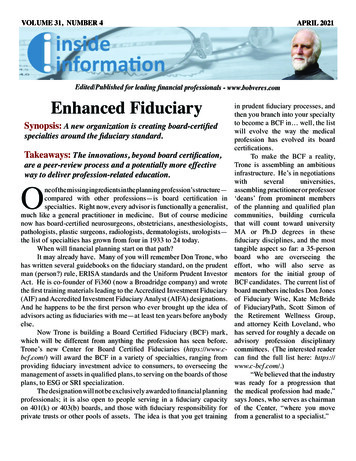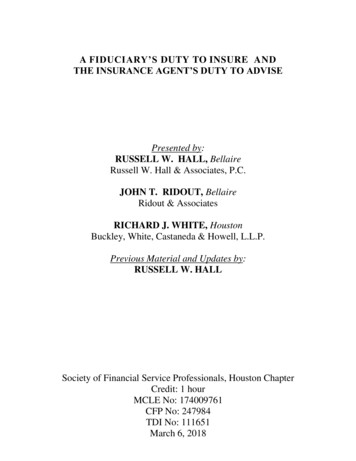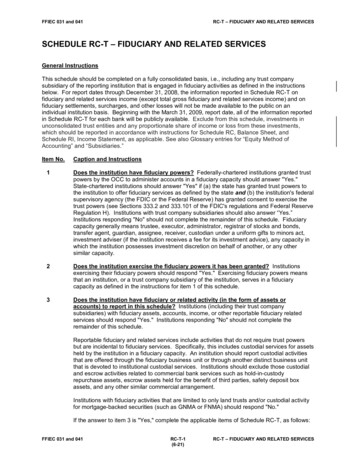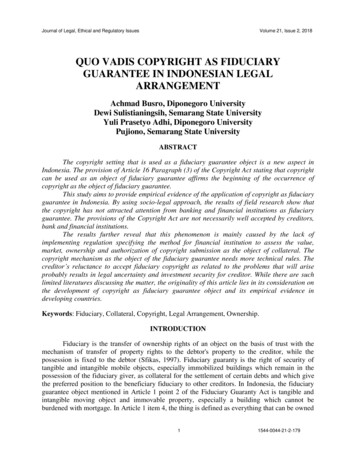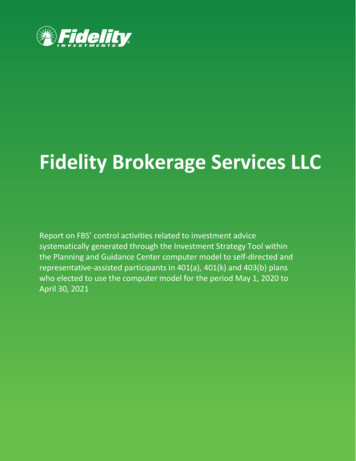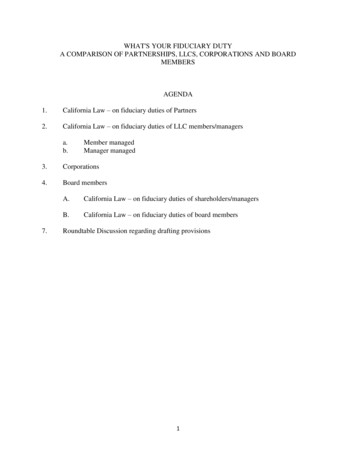
Transcription
WHAT'S YOUR FIDUCIARY DUTYA COMPARISON OF PARTNERSHIPS, LLCS, CORPORATIONS AND BOARDMEMBERSAGENDA1.California Law – on fiduciary duties of Partners2.California Law – on fiduciary duties of LLC members/managersa.b.Member managedManager managed3.Corporations4.Board members7.A.California Law – on fiduciary duties of shareholders/managersB.California Law – on fiduciary duties of board membersRoundtable Discussion regarding drafting provisions1
PARTNERSHIPSCalifornia law defines a partnership as "the association of two or more persons to carry on as coowners a business for profit.whether or not the persons intend to form a partnership." Cal. Corp.Code § 16202(a).§ 16404. Fiduciary duties(a) The fiduciary duties a partner owes to the partnership and the other partners are the duty ofloyalty and the duty of care set forth in subdivisions (b) and (c).(b) A partner’s duty of loyalty to the partnership and the other partners includes all of thefollowing:(1) To account to the partnership and hold as trustee for it any property, profit, or benefitderived by the partner in the conduct and winding up of the partnership business or derived from ause by the partner of partnership property or information, including the appropriation of apartnership opportunity.(2) To refrain from dealing with the partnership in the conduct or winding up of thepartnership business as or on behalf of a party having an interest adverse to the partnership.(3) To refrain from competing with the partnership in the conduct of the partnershipbusiness before the dissolution of the partnership.(c) A partner’s duty of care to the partnership and the other partners in the conduct and winding upof the partnership business is limited to refraining from engaging in grossly negligent or recklessconduct, intentional misconduct, or a knowing violation of law.(d) A partner shall discharge the duties to the partnership and the other partners under this chapteror under the partnership agreement and exercise any rights consistently with the obligation of goodfaith and fair dealing.(e) A partner does not violate a duty or obligation under this chapter or under the partnershipagreement merely because the partner’s conduct furthers the partner’s own interest.(f) A partner may lend money to and transact other business with the partnership, and as to eachloan or transaction, the rights and obligations of the partner regarding performance or enforcementare the same as those of a person who is not a partner, subject to other applicable law.(g) This section applies to a person winding up the partnership business as the personal or legalrepresentative of the last surviving partner as if the person were a partner.In general, under the California Revised Limited Partnership Act (Corp.Code, § 15611 et seq.),partners may determine by agreement many aspects of their relationship.2
California Corp.Code, § 15618 states:A general partner of a limited partnership is subject to the same restrictions, and has the sameliabilities to the partnership and other partners, as in a general partnership.To establish a breach of fiduciary duty, a plaintiff must show “(1) existence of a fiduciary duty; (2)breach of the fiduciary duty; and (3) damage proximately caused by the breach.” People ex rel.Harris v. Rizzo, (2013) 214 Cal.App.4th 921, 950 (quotation omitted). Section 16404 of theCalifornia Corporations Code provides a nonexclusive list of the fiduciary duties that one partnerowes to another. See Enea v. Superior Court, (2005) 132 Cal.App.4th 1559, 1565, (holding thatthe list is “comprehensive, but not exhaustive” (quotation and emphasis omitted)). Becausefiduciary duties are imposed by statute, pleading the existence of partnership or joint venture issufficient to establish the existence of a fiduciary duty. See Sacramento E.D.M., Inc. v. HynesAviation Indus., Inc., 965 F.Supp.2d 1141, 1150 (E.D.Cal.2013).The fiduciary duties imposed by statute include the duty to account to the partnership for profitsand for benefits “derived from a use by [a] partner of partnership property or information,including the appropriation of a partnership opportunity.” Cal. Corp. Code § 16404(b)(1).Partnership is a fiduciary relationship, and partners are held to the standards and duties of a trusteein their dealings with each other. "Partners are trustees for each other, and in all proceedingsconnected with the conduct of the partnership every partner is bound to act in the highest goodfaith to his copartner and may not obtain any advantage over him in the partnership affairs by theslightest misrepresentation, concealment, threat or adverse pressure of any kind. [Citations.]" (Leffv. Gunter (1983) 33 Cal.3d 508, 514, internal quotation marks omitted.) Moreover, this dutyextends to all aspects of the relationship and all transactions between the partners. "Each [partner]occupie[s] the position of a trustee to the other with regard to all the partnership transactions,including the transactions contemplated by the firm and constituting the object or purpose forwhich the partnership was formed." (Ibid.) BT-I v. Equitable Life Assurance Society of the UnitedStates, (1999) 75 Cal.App.4th 1406, 1410-1411.Whether a fiduciary duty has been breached is a question of fact. (Amtower v. Photon Dynamics,Inc. (2008) 158 Cal.App.4th 1582, 1599; Agam v. Gavra, (2015) 236 Cal.App.4th 91, 113)3
LIMITED LIABAILITY COMPANIESCalifornia Corporation's Code § 17704.09. Fiduciary duties of members and managers(a) The fiduciary duties that a member owes to a member-managed limited liability companyand the other members of the limited liability company are the duties of loyalty and care undersubdivisions (b) and (c).(b) A member’s duty of loyalty to the limited liability company and the other members islimited to the following:(1) To account to the limited liability company and hold as trustee for it any property,profit, or benefit derived by the member in the conduct and winding up of the activities of alimited liability company or derived from a use by the member of a limited liability companyproperty, including the appropriation of a limited liability company opportunity.(2) To refrain from dealing with the limited liability company in the conduct or windingup of the activities of the limited liability company as or on behalf of a person having an interestadverse to the limited liability company.(3) To refrain from competing with the limited liability company in the conduct orwinding up of the activities of the limited liability company.(c) A member’s duty of care to a limited liability company and the other members in the conductand winding up of the activities of the limited liability company is limited to refraining fromengaging in grossly negligent or reckless conduct, intentional misconduct, or a knowing violationof law.(d) A member shall discharge the duties to a limited liability company and the other membersunder this title or under the operating agreement and exercise any rights consistent with theobligation of good faith and fair dealing.(e) A member does not violate a duty or obligation under this article or under the operatingagreement merely because the member’s conduct furthers the member’s own interest.(f) In a manager-managed limited liability company, all of the following rules apply:(1) Subdivisions (a), (b), (c), and (e) apply to the manager or managers and not themembers.(2) Subdivision (d) applies to the members and managers.4
(3) Except as otherwise provided, a member does not have any fiduciary duty to thelimited liability company or to any other member solely by reason of being a member.A California LLC is member-managed unless both the Articles of Incorporation and theOperating Agreement state that it is to be manager-managed. Cal. Corp. Code §l 7704.07(a).Good faith, in an LLC context, requires "the utmost loyalty and in the highest good faith," suchthat the person owing the duty may not obtain any advantage by even the slightestmisrepresentation or concealment. Feresi v. The Livery, LLC (2014) 232 Cal.App.4th 419, 425.Am. Master Lease LLC v. Idanta Partners, Ltd. (2014) 225 Cal.App.4th 1451, 1475 (a defendantcan be liable for aiding and abetting another's breach of fiduciary duty).A member can also be personally liable for any tortious conduct. (See People v. PacificLandmark (2005) 129 Cal. App. 4th 1203, 1213.)5
CORPORATIONSAn officer or director’s fiduciary obligations under California law can generally be distilled intotwo duties: the duty of loyalty and the duty of care. With regard to corporate directors, both ofthese duties have been codified in California Corporations Code section 309(a) which provides:“A director shall perform the duties of a director, including duties as a member of any committeeof the board upon which the director may serve, in good faith, in a manner such director believesto be in the best interests of the corporation and its shareholders and with such care, includingreasonable inquiry, as an ordinarily prudent person in a like position would use under similarcircumstances.”When it comes to shareholders, the California Supreme Court refused to interpret a buy-sellagreement in a way that would deprive a minority shareholder in a closely held corporation ofthe fiduciary duty owed by majority shareholders and other shareholder rights that generallyapply in non-closely held corporations. (Stephenson v. Drever, (1997), 16 Cal.4th 1167).A minority shareholder in a closely held California corporation is subject to the same fiduciaryduties he or she would owe in a non-closely held corporation. See Lynch v. Cook, (1983) 148Cal.App.3d 1072, (minority shareholder in non-closely held corporation, “acting in anindependent and individual capacity, did not owe or breach any special fiduciary duty” toanother minority shareholder), overruled on other grounds by In re Marriage of Arceneaux,(1991); 51 Cal.3d 1130, Stephenson Supra., at 1307 (“[U]nless otherwise provided in the articlesof incorporation or in the stock certificate, a shareholder has the right to transfer or hypothecatehis shares. A shareholder without a shareholder’s rights is at best an anomaly, and at worst ashadowy figure in corporate limbo who would be . largely defenseless against neglect oroverreaching by management.”). Merner v. Merner, 129 Fed.Appx. 342 (2005)United States Supreme Court in Pepper v. Litton, 308 U.S. 295, the court held: “A director is afiduciary. . . . So is a dominant or controlling stockholder or group of stockholders. . . . Theirpowers are powers in trust. . . . Their dealings with the corporation are subjected to rigorousscrutiny and where any of their contracts or engagements with the corporation is challenged theburden is on the director or stockholder not only to prove the good faith of the transaction butalso to show its inherent fairness from the viewpoint of the corporation and those interestedtherein. . . . The essence of the test is whether or not under all the circumstances the transactioncarries the earmarks of an arm’s length bargain. If it does not, equity will set it aside.’ Referringdirectly to the duties of a director the court stated . . . ‘He who is in such a fiduciary positioncannot serve himself first and his Cestuis second. He cannot manipulate the affairs of hiscorporation to their detriment and in disregard of the standards of common decency and honesty.He cannot by the intervention of a corporate entity violate the ancient precept against servingtwo masters. He cannot by the use of the corporate device avail himself of privileges normallypermitted outsiders in a race of creditors. He cannot utilize his inside information and hisstrategic position for his own preferment. He cannot violate rules of fair play by doing indirectly6
through the corporation what he could not do directly. He cannot use his power for his personaladvantage and to the detriment of the stockholders and creditors no matter how absolute in termsthat power may be and no matter how meticulous he is to satisfy technical requirements. For thatpower is at all times subject to the equitable limitation that it may not be exercised for theaggrandizement, preference, or advantage of the fiduciary to the exclusion or detriment of theCestuis. Where there is a violation of these principles, equity will undo the wrong or intervene toprevent its consummation.’ This is the law of California.’ (109 Cal.App.2d 105.)The California Supreme Court in Banc in Jones v. H. F. Ahmanson & Co., 1 Cal.3d 93 (1969)indicated that a Majority Shareholders’ Fiduciary Responsibility:The Courts of Appeal have often recognized that majority shareholders, either singly or acting inconcert to accomplish a joint purpose, have a fiduciary responsibility to the minority and to thecorporation to use their ability to control the corporation in a fair, just, and equitable manner.Majority shareholders may not use their power to control corporate activities to benefitthemselves alone or in a manner detrimental to the minority. Any use to which they put thecorporation or their power to control the corporation must benefit all shareholdersproportionately and must not conflict with the proper conduct of the corporation’s business.7
BOARD MEMBERSThe duties of a board member are codified under in California Corporations Code Sections5230-5239.Corporations Code 5231 states:(a) A director shall perform the duties of a director, including duties as a member of anycommittee of the board upon which the director may serve, in good faith, in a manner thatdirector believes to be in the best interests of the corporation and with such care, includingreasonable inquiry, as an ordinarily prudent person in a like position would use under similarcircumstances.(b) In performing the duties of a director, a director shall be entitled to rely on information,opinions, reports or statements, including financial statements and other financial data, in eachcase prepared or presented by:(1) One or more officers or employees of the corporation whom the director believes to bereliable and competent in the matters presented;(2) Counsel, independent accountants or other persons as to matters which the directorbelieves to be within that person's professional or expert competence; or(3) A committee upon which the director does not serve that is composed exclusively of any orany combination of directors, persons described in paragraph (1), or persons described inparagraph (2), as to matters within the committee's designated authority, which committee thedirector believes to merit confidence, so long as, in any case, the director acts in good faith, afterreasonable inquiry when the need therefor is indicated by the circumstances and withoutknowledge that would cause that reliance to be unwarranted.(c) Except as provided in Section 5233, a person who performs the duties of a director inaccordance with subdivisions (a) and (b) shall have no liability based upon any alleged failure todischarge the person's obligations as a director, including, without limiting the generality of theforegoing, any actions or omissions which exceed or defeat a public or charitable purpose towhich a corporation, or assets held by it, are dedicated.Government Code § 20150. Interest in investments; borrowing or using funds or deposits;becoming indorser, surety or obligor on investmentsA board member or employee of the board shall not, directly or indirectly:(a) Have any interest in the making of any investment, or in the gains or profits accruingtherefrom.(b) For himself or herself or as an agent or partner of others, borrow any funds or deposits ofthis system, nor use those funds or deposits in any manner except to make current and necessarypayments authorized by the board.(c) Become an indorser, surety or obligor on investments by the board.8
Denae Hildebrand BuddeManaging ShareholderDenae Budde is a California native with more than 23 years of experience in real estate,business and insurance coverage. She has successfully represented individuals,businesses, financial institutions and insurers in litigation as well in negotiating anddrafting contracts, business formation documents, real estate documents and preparingcoverage opinion letters. Denae has tried over fifty cases to verdict including a multimillion dollar insurance coverage jury trial.Denae has been a member of the Defense Research Institute (DRI) Insurance LawCommittee and Women in the Law Committee. Denae has been a presenter on anumber of trial, arbitration and insurance matters as well as published several articles.She has served on the Board of Directors for CCCBA and has been an Affiliate Governoron the Board of California Women Lawyers and Past President of the Contra CostaCounty Women's Section. She has also been a member of the Contra Costa Countychapter of the Robert G. McGrath Inn of Court.In November 2014, Denae was a panelist at the Contra Costa County Bar Association'sMCLE Spectacular, entitled: "Mediation is a Process, Not an Event: Creating a StrategicPlan for Success that Works."In Denae presented on the "How to Start a Law Practice" with Aaron Feldman for theCCCBA in April of 2015.In Denae spoke to the business section in January 2016 on "THE PROS AND PITFALLSOF BINDING CONTRACTUAL ARBITRATION IN CALIFORNIA".9
In general, under the California Revised Limited Partnership Act (Corp.Code, § 15611 et seq.), partners may determine by agreement many aspects of their relationship. 3 California Corp.Code, § 15618 states: A general partner of a limited partnership is subject to the same restrictions, and has the same

